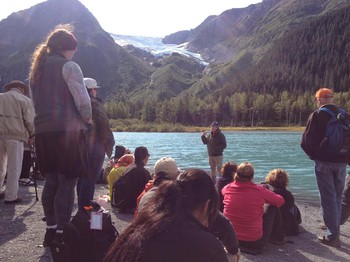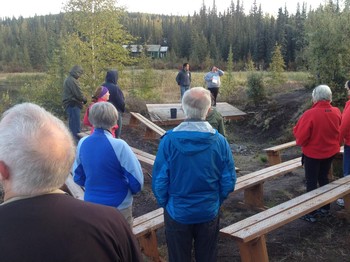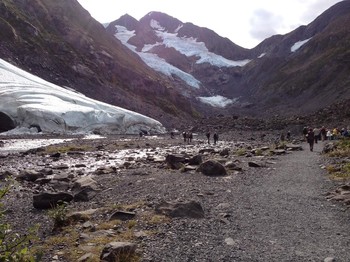Hotter summers, colder winters, droughts, floods, stronger storms. These are all results of climate change, a phenomenon that has been in dispute for years, but that gets harder and harder to deny.
In Alaska in particular, the signs are more and more obvious and Alaskans want to help get the word out and, if necessary, lead the change.
Presbyterians for Earth Care and the Presbytery of the Yukon hosted a five-day trip early last month attended by 25 people from the lower 48 states who looked at the issue of climate change and how it is affected the polar environment.
Presentations took a three pronged approach, with some speakers addressing it from the scientific perspective, some from the faith perspective, and some from Native American perspective.
“What we wanted to do was combine three voices and look at the moral urgencies of dealing with this issue now and ask the question how do we get individual churches and presbyteries effectively involved in working for change,” said the Rev. Curt Karns, executive presbyter for the Yukon Presbytery.

Doug Causey. —Photo courtesy of Curt Karns
Doug Causey of the University of Alaska-Anchorage, Michael Castellini of the University of Alaska-Fairbanks, and retired professor Larry Johnson represented the scientific voice. The group visited glaciers to learn about glacial retreat and discussed ocean acidification and biological changes.
Johnson, who for 30 years taught students about permafrost — any ground that stays frozen for two consecutive seasons or longer — made his point by sticking a measuring rod into the ground until he hit permafrost.
“He still does the same thing but now his rod goes down much deeper in the same places,” says Karns. “He didn’t start out trying to measure change, he was just trying to show people and define permafrost and he started to notice he had to go deeper and deeper to demonstrate the same thing so it was kind of a surprise, unexpected research project.”
That climate change is having an effect on the environment in Alaska is not in doubt. The question that needs to be tackled is “What's next?”
Karns and other church leaders from the area represented the second voice, the voice of the faith community, a voice Karns hopes can be used to discern what to do and spread the word to others through the churches.
“The Christian faith is about living right relationships and we need to recognize that we have not lived a right relationship with the rest of creation,” says Karns. “Native American traditions have been much more effective in living in harmony in a right relationship with the rest of creation. Native cultures have so much teaching about how to do this and this is a good time for those teachings to come through.”
Ilarion Merculiess, a respected Aleut (Alaska native) elder, and Patrician Cochran, an Inupiat (another Native Alaska tribe) who is executive director of the Alaska Native Science Commission, brought the third voice, that of Native American traditional knowledge.

Morning worship. —Photo courtesy of Curt Karns
“We combined those three voices and found that there's an awful lot of Native American traditional wisdom that can guide us and kind of points out how our own Western traditions have kind of led us down this path and the same with the new path to go. It turns out there’s a lot of wisdom already available to us and wonderful Christian Native American people who would share that with us.”
Karns said the work continues as far as trying to determine next steps. They may continue to host more trips. Interest was expressed from some in the academic world but the timing of the trip precluded their participation as they started the new fall school term.
“Would it be a good idea to put together a mid-term where they could get some academic groups to come up and make it part of a for credit class in seminary or Christian college classes? That’s something we’re considering,” Karns says.
Karns says there is also some consideration being given to doing the program ecumenically to reach a broader audience from the state of Alaska and beyond.
“Advocacy is real important right now. We need to be influencing national policies,” he adds.
It’s not just about telling people there’s a problem, but also about finding those early adapters who are doing things to correct the problem because those are the people who are doing the things the rest of the world might be willing to adopt.
“Some people are the prophets and prophets tend to be not well accepted. Some people are the mainstream. In between are the early adapters and the early adapters are the ones who manage to translate what the prophets have already seen so that it can become more acceptable to the mainstream,” explains Karns. “So we need to figure out who are the prophets and who are the early adapters so we can start working on that so it can become mainstream. We saw some of the amazing things individuals are doing ever day.”
For example, the group visited an urban homestead in downtown Anchorage. Instead of a lawn, the home featured an edible herb garden in front and a vegetable garden in back. In Alaska, 98% of food is shipped in, using fossil fuel, but Karns said these organic gardens produce an amazing amount of food. Curious neighbors come by to check it out and this is how word spreads.
“How do you live in a way that is sustainable providing a permanent agriculture and a permanent people culture in ways that are sustainable,” says Karns. “We are realizing there are ways that actually match biblical teachings for planning and living into future that we are stewards to God’s creation, our own lives, and our relationships with others.”
Toni Montgomery is a free-lance writer in Statesville, N.C., where she also serves as church secretary for First Presbyterian Church of Statesville. She is a frequent contributor to Presbyterian News Service.

